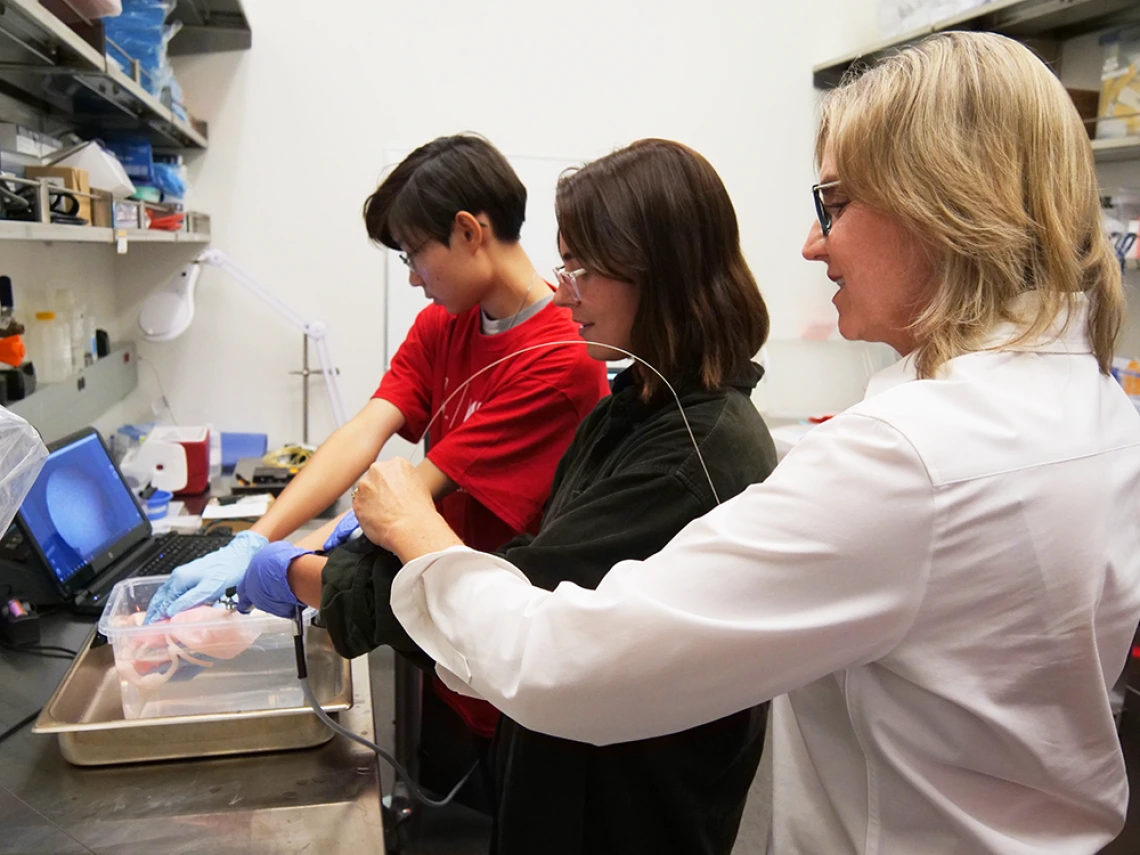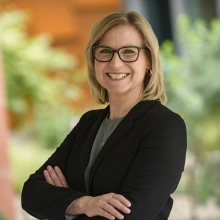Faculty innovators named to the National Academy of Inventors
New Senior Members have made impactful contributions at the intersection of optical and health sciences.

Jennifer Barton (right) works with two high-school students from the KEYS program in the lab.
The BIO5 Institute
The National Academy of Inventors has named two University of Arizona faculty researchers as members of its 2025 class of Senior Members. The newly named cohort of 162 honorees from across the nation includes Professor Jennifer Barton, Thomas R. Brown Distinguished Chair of Biomedical Engineering and director of the BIO5 Institute; and Associate Professor Euan McLeod. Both hold appointments in the James C. Wyant College of Optical Sciences.
“Garnering national recognition as an inventor is a huge accomplishment,” said Doug Hockstad, associate vice president of Tech Launch Arizona, the office of the U of A that works with faculty, staff and student inventors to commercialize the products of their work. “Having raised the bar yet again and doing over $1 billion in research, our talented and ambitious faculty are going to continue to invent at the highest levels and make contributions to society that we can’t yet fathom.”
NAI Senior Members are active faculty, scientists, and administrators from NAI Member Institutions who have demonstrated remarkable innovation in producing technologies that have brought, or aspire to bring, real impact on the welfare of society. They also have growing success in patents, licensing, and commercialization, while educating and mentoring the next generation of inventors.
Adding Barton and McLeod to the University of Arizona’s list of NAI honorees brings the total number of Fellows and Senior Members to 47. Between them all, they have over 1000 issued U.S. patents, a demonstration of their commitment to innovative research that drives positive change and contributes to a better world.
A falloposcope to detect early ovarian cancer

Jennifer Barton
The BIO5 Institute
Jennifer Barton, Thomas R. Brown Distinguished Chair of Biomedical Engineering and director of the BIO5 Institute, has made a career of applying technology to solve real-world problems. She began as an electrical engineer with McDonnell Douglas on the International Space Station program. She then went on to a biomedical engineering Ph.D. at the University of Texas at Austin, where she worked on laser treatment of skin blood vessel disorders. A desire to increase treatment efficacy led to groundbreaking research in altering tissue optical properties and methods to slow blood flow. Her work in imaging blood vessels led to advances in holographic, optical coherence tomography, and fluorescence imaging systems, including novel miniature endoscopes for visualizing internal organs.
As a result of that work, today, she has eight patents that bear her name, and as the director of BIO5, she helps lead over 350 faculty to catalyze interdisciplinary research on biological grand challenges.
“I am deeply honored to be recognized as an NAI Senior Member and to join such an esteemed group of academic innovators,” said Barton. “This distinction reflects not only my work but also the incredible support and collaborative environment fostered by the University of Arizona. Innovation thrives when ideas are nurtured and given the opportunity to translate into real-world impact, and I am grateful to my colleagues, students, and Tech Launch Arizona for their dedication to advancing groundbreaking research, technology, and commercialization. I look forward to continuing to develop impactful solutions and mentoring the next generation of inventors who will shape the future of human health.”
On the national stage, Barton serves as the immediate past president of SPIE, the International Optics and Photonics Society, and last year rotated off the National Advisory Council of the National Institutes of Biomedical Imaging and Bioengineering.
She is a dedicated champion of innovation and maintains a close relationship with Tech Launch Arizona to help expand the impact of research and innovation taking place across the U of A. One of her patents is for a sub-millimeter diameter falloposcope that can traverse the female reproductive system and search for signs of early-stage ovarian cancer. She is currently working with TLA to move the invention out into the marketplace where it can improve and save lives.
Barton also maintains a deep commitment to teaching and inspiring the next generation of inventors and has mentored over 100 graduate, undergraduate, and high school students, most of whom have gone on to industry positions and startups.
Tunable liquid lenses for precise measurement and inspection

Euan McLeod
James C. Wyant College of Optical Sciences
Euan McLeod serves as an associate professor in the Wyant College of Optical Sciences and the BIO5 Institute and is an affiliate member of the UA Cancer Center. He is a Senior Member of SPIE and Optica and won an NSF CAREER award in 2021. He did two postdocs, one in electrical engineering and bioengineering at UCLA and another in applied physics at Caltech. He earned his Ph.D. from Princeton University and a B.S. from Caltech.
McLeod’s interests lie at the intersection of optics, nanoscience, and soft bio-materials science. Along with having published upwards of 45 papers, he has been awarded seven patents in the areas of high-speed varifocal lenses based on acoustic modulation; lens-free holographic imaging of nanoparticles, viruses, and biomarkers; and the use of optical tweezers in fabricating micro- and nano-structured materials. He received the Edison Award from the Research and Development Council of New Jersey for his work on high-speed varifocal lenses.
His work commercializing inventions has focused on tunable acoustic gradient index of refraction (TAG) lenses. TAG lenses are liquid lenses bounded by a vibrating tube with piezoelectric properties; piezoelectric materials change their electrical properties when mechanically deformed, and likewise, their mechanical properties when subjected to an electrical field. The vibrations generated by the tube send sound waves through the liquid, which modulate its density and thereby its refractive index. This leads to a lens whose focal length varies at rates up to hundreds of kilohertz, much faster than other varifocal lens technologies.
The high-speed focusing provided by the TAG lens is particularly useful for microscopy and machine vision. Following Prof. McLeod’s Ph.D. in 2009, a startup company called TAG Optics licensed this technology in 2011 and started to sell TAG lenses commercially that year. In 2016, because of its machine vision applications, Mitutoyo, an industry leader in precision metrology and optical components, acquired a controlling interest in TAG Optics.
Prof. McLeod has mentored 11 Ph.D. students, 6 Master’s students, and 29 undergraduate students. These students are included as inventors on invention disclosures, provisional patent applications, and full applications when those inventions derive from student research.
“This is my first engagement with any of the National Academies,” McLeod said, “so I am thrilled to have received this recognition. I hope it is just a first step toward more innovation and inventions in my future.”
Barton and McLeod will be inducted as Senior Members with the rest of their cohort at a ceremony held at the National Academy of Inventors Annual Meeting taking place in Atlanta, Georgia, June 23-26, 2025.
The ability to nominate an individual for NAI Senior Member recognition is an exclusive opportunity afforded to NAI Member Institutions to recognize their outstanding innovators and foster a culture of innovation and invention on their campuses. These Member Institutions – which include the University of Arizona – are widely regarded as innovation powerhouses that continuously promote and foster the spirit of innovation at their institutions and in their communities.

